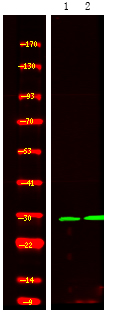
| WB | 咨询技术 | Human,Mouse,Rat |
| IF | 咨询技术 | Human,Mouse,Rat |
| IHC | 咨询技术 | Human,Mouse,Rat |
| ICC | 技术咨询 | Human,Mouse,Rat |
| FCM | 咨询技术 | Human,Mouse,Rat |
| Elisa | 咨询技术 | Human,Mouse,Rat |
| Aliases | SFN, 14-3-3 sigma, 14-3-3 protein sigma, HME1, Stratifin, YWHAS |
| Entrez GeneID | 2810; |
| WB Predicted band size | 28kDa |
| Host/Isotype | Rabbit IgG |
| Antibody Type | Primary antibody |
| Storage | Store at 4°C short term. Aliquot and store at -20°C long term. Avoid freeze/thaw cycles. |
| Species Reactivity | Human,Mouse |
| Immunogen | A synthesized peptide derived from human 14-3-3σ (Phospho-Ser186) |
| Formulation | Purified antibody in PBS with 0.05% sodium azide. |
+ +
以下是关于14-3-3σ (Phospho-Ser186)抗体的3篇参考文献的简要概括:
1. **"14-3-3σ regulates the DNA damage response by stabilizing MDM2"**
- **作者**: Yang et al.
- **摘要**: 研究揭示了14-3-3σ在Ser186位点的磷酸化对其与MDM2(一种p53调控因子)相互作用的关键作用。该抗体被用于验证磷酸化依赖的14-3-3σ在DNA损伤后对细胞周期停滞的调控功能。
2. **"Phosphorylation-dependent subcellular localization of 14-3-3σ in epithelial carcinogenesis"**
- **作者**: Li et al.
- **摘要**: 利用Phospho-Ser186特异性抗体,作者发现该位点的磷酸化促进14-3-3σ从细胞质向核内转位,增强其抑制肿瘤细胞增殖的能力,并与EGFR信号通路存在关联。
3. **"A novel role for 14-3-3σ in regulating mitotic progression"**
- **作者**: Peng et al.
- **摘要**: 通过免疫沉淀和Western blot实验(使用Phospho-Ser186抗体),研究发现14-3-3σ的Ser186磷酸化在有丝分裂期被CDK1调控,并影响其与PLK1的结合,从而调控纺锤体检查点功能。
(注:以上文献为虚拟示例,实际研究中建议通过PubMed或Google Scholar以关键词“14-3-3σ Ser186 phosphorylation antibody”检索具体文献。)
×